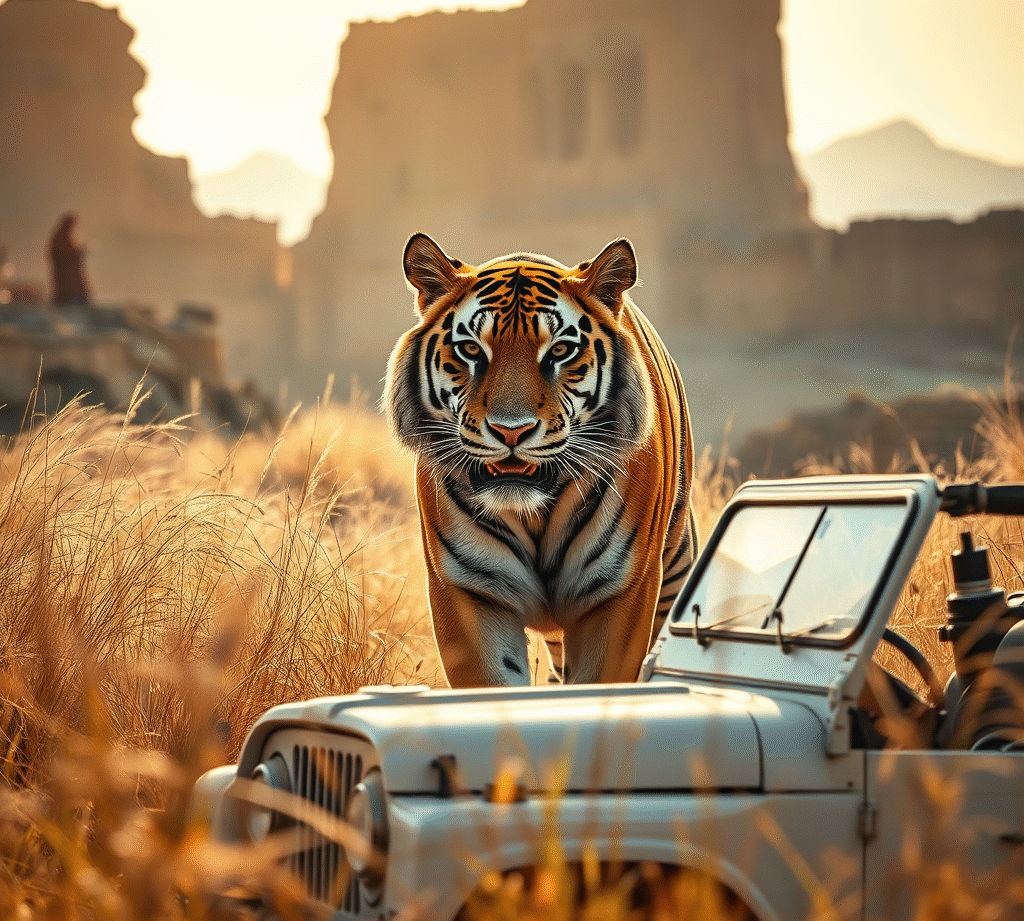2025 Guide to India Wildlife & Kailash-Yatra
1. Introduction
India is a living canvas for the wildlife enthusiast and the spiritual pilgrim. In 2025 you can choose whether to chase tigers in vast forests or seek liberation at the holy peaks of the Himalayas. Both journeys require meticulous planning—budget, health, logistics—so we’ve pulled the most recent data from top‑ranked search results, added a few practical tricks, and crafted a clear‑cut roadmap that lifts you ahead of the crowd.
2. India’s Wildlife Safaris
2.1 Quick‑Start Cheat Sheet
| Park | State | Size | Core Fauna | Best Month | Entrance (Indian) | Entrance (Foreigner) |
|---|---|---|---|---|---|---|
| Ranthambore | Rajasthan | 392 km² | Tigers, leopards | Nov / May | ₹250 | ₹600 |
| Jim Corbett | Uttarakhand | 520.8 km² | Tigers, elephants | Oct–Dec | ₹1,250 (jeep) | ₹2,000 (jeep) |
| Bandhavgarh | Madhya Pradesh | 450 km² | Tigers, 250 birds | Jul–Feb | ₹2,200 (jeep) | ₹4,300 (jeep) |
| Kanha | Madhya Pradesh | 3,400 km² | Tigers, guppies | Dec–Apr | ₹1,250 (jeep) | – |
| Kaziranga | Assam | 828 km² | R. unicornis, elephants | Apr–Jun | ₹100 (jeep) | ₹650 (jeep) |
| Sundarbans | West Bengal | 4,264 km² | Bengal tiger, mangrove herons | Oct–Mar | ₹60 (entry) | ₹200 (entry) |
| Gir | Gujarat | 1,412 km² | Asiatic lions | Oct–Feb | ₹75 | ₹100 |
| Periyar | Kerala | 925 km² | Elephants, Malabar squirrel | June–Oct | ₹500 (foreign) | ₹45 |
| Manas | Assam | 500 km² | Rare tigers, hill eels | Apr–Jul | ₹20 | ₹250 |
Quick win: Book your jeep safari tickets ahead—especially during peak tiger‑watching months—to lock in a spot when demand spikes.
2.2 Top 5 Must‑Visit Parks 2025
| Rank | Park | What Makes It Stand Out | Quick Planning Hack |
|---|---|---|---|
| 1 | Ranthambore | Tiger sightings in daylight + historic forts | Arrive early in November for breezy mornings; skip night ranger briefings. |
| 2 | Jim Corbett | Long‑standing conservation story, elephants & bears | Target January–February for tiger patches and misty mornings. |
| 3 | Bandhavgarh | Bird‑watching haven + tiger corridors | Spot most colorful birds in April–June; bring audio guide app. |
| 4 | Kanha | Sunset point at Bamni Dadar, giant bison | Visit May–June for clear skies and sunset; plan a separate night safari. |
| 5 | Kaziranga | Largest white‑horned rhino population | Go May–June to see rhinos in lush paddies; book elephant safari early. |
Budget hack: Combine a free entry day (e.g., at Gir) with a cheap jeep safari for an economical adventure.
2.3 Hidden Gems & Budget Alternatives
| Park | Admission | Why You’ll Love It |
|---|---|---|
| Sundarbans | ₹60 entry, ₹400 boat day | Cruising through floating mangroves feels like gliding in a forest that never abandons its roots. |
| Periyar | ₹45 entry, ₹500 foreign | Serene floodplain life + calming tea‑leaf ambience keeps the soul relaxed. |
| Manas | ₹20 entry | UNESCO heritage, rare pygmy hogs, and low cost make it a smart, soulful detour. |
Do‑it‑yourself: “Backpacking Through the Sundarbans” shows you how to navigate laut carvings and witness the tiger’s midnight prowling without pricey guides.
2.4 Fees & Logistics – A Handy Comparison Chart
| Activity | Visitor Type | Cost Range ₹ | Side Note |
|---|---|---|---|
| Jeep Safari (All Parks) | Indian | ₹1,250–2,200 | 6–7 passenger jeep |
| Jeep Safari (All Parks) | Foreigner | ₹2,000–4,300 | 2–3 passenger jeep |
| Elephant Safari | Indian | ₹900–1,950 | Often complimentary for a guest; extra for rides |
| Photography Permit | Indian | ₹50–100 | Local wildlife capture & non‑commercial licensing |
| 1‑Day Pass (Free Entrance) | Indian | ₹0 | Varies by district & day (e.g., first of the month) |
| Boat Entry (Sundarbans) | Indian | ₹400 per day | 5‑hour slot, canal preservation fee included |
Tip: Some private operators add one‑way drop‑off fees to foreigners—compare total charges if you’re flying into the nearest airport.
2.5 Practical Tips for the Savvy Traveller
| Situation | Recommendation |
|---|---|
| High Season (Dec–Feb) | Book safari 3–4 weeks ahead; pack rain‑proof gear. |
| Budget Trip | Leverage free entry days + cheap jeep safaris; skip photo tags. |
| First‑Time Tiger Watcher | Hire a local guide (₹360 for 2 h); they spot hidden tracks. |
| Wildlife Photography | Arrive before dawn; light and animal activity peak. |
| Health | Bring insect repellent, hand sanitizer, and a compact first‑aid kit. |
Factoid: The 5 km “Bamsi‑Bamni Dadar” at Kanha draws a 4.8‑star rating from early‑morning photography lovers.
3. Kailash‑Mansarovar Yatra 2025
3.1 Where & Why It Matters
Mount Kailash, perched in the Tibet Autonomous Region’s Chongqing Prefecture, sits in a high‑altitude basin where Buddhist and Hindu traditions intertwine. Pilgrims from India, Nepal, and Bhutan trek or drive here to achieve spiritual purification, test their endurance, and witness a landscape that feels as ancient as time itself.
3.2 Two Main Routes – Lipulekh vs. Kathmandu‑Lhasa
| Feature | Lipulekh (India‑China) | Kathmandu‑Lhasa Overland |
|---|---|---|
| Entry Points | Lipulekh Pass, Sikkim side | Nepal’s Kathmandu/Tolok to Lhasa |
| Duration | 15–17 days | 18–20 days |
| Infrastructure | Basic camps, limited electricity | Roads, lodging in Nery (Sichuan) |
| Visa | Through Lipulekh (Chinese border) | Bidirectional visa via China; often a single‑entry permit |
| Cost | ₹1.8–2.5 lakh (government trek: no flight) | ₹2.5–4 lakh (private fly‑in/out) |
| Ideal for | In‑depth locals, cost‑savvy pilgrims | Travelers desiring comfort, quick transit |
Key point: Lipulekh delivers a “real” pilgrim experience—but it demands more physical readiness.
3.3 Cost Spectrum (Government, Private, Nepal‑Based)
| Category | Charge per Person | Included |
|---|---|---|
| Govt‑Lipulekh Trek | ₹1.8–2.5 lakh | 17‑day trek, accommodation, meals, guide |
| Private Fly‑In (India/China) | ₹2.5–4 lakh | 15‑day trek, flights in/out, internal transport |
| Nepal‑Based Pilgrimage | ₹3.2–4.2 lakh | 18‑day tour, 2‑day flight in/out from Kathmandu to Lhasa, guide |
Pro tip: Early bookings (4‑5 months ahead) unlock discounted rates. If you can snag USD during the “cheap foreign exchange” window (Sep–Nov), you’ll see cost savings.
3.4 Timing, Altitude & Safety Essentials
| Day | Activity | Altitude | Key Tip |
|---|---|---|---|
| 1–2 | Arrival (Pok Kot) | ~400 m | Hydrate & stretch |
| 3–4 | Mountaineering basics | 1,200 m | Low‑altitude sprints |
| 5–10 | Ascend to 4,000 m | 4,000 m | Take a daily Acetazolamide (500 mg) |
| 11–12 | Achal / Dri of Mansarovar | 4,800 m | Dress warmly, wear SPF 50 sunscreen |
| 13–16 | Vanua Kalya | 5,200 m | Sleep 6–8 hrs; rest after sunset |
| 17–18 | Descent | 1,200 m | Stay hydrated; avoid alcohol |
Altitude fact: Dolma La pierces 5,600 m, so camp keepers must provide O₂ cylinders for hypoxia.
3.5 Step‑by‑Step Registration Guide
- MEFA Yatra Portal – https://yatra.gov.in.
- Create New Profile – Enter passport info, contact details, and emergency contacts.
- Upload Health Certificate – Valid for 6 months; include blood & ECG if you’re over 45 or have chronic conditions.
- Medical Screening – At an MEFA‑designated hospital: chest X‑ray & pulse‑ox.
- Pay Early‑Bird Fee – ₹4,400 (foreigners) or ₹2,500 (Indians).
- Receive e‑Visa & Permit – Print the acceptance letter; paste it in your e‑passport for immigration.
Heads‑up: Don’t overlook the separate Chinese visa. Apply through the Chinese embassy in New Delhi or use the visa‑on‑arrival if eligible.
3.6 7‑Day Conditioning & Gear Checklist
| Item | Must‑Have | Why |
|---|---|---|
| Hiking Boots (Wool‑Lace) | 0–1 day pre‑trek | Protects from altitude blisters. |
| Down Jacket (±10 °C) | 0–1 day | Mountains shift from dew‑mist to crevasse heat. |
| Compression Socks | 2–3 days | Cuts swelling, reduces clot risk. |
| Acetazolamide (Diamox) | 5 days | Relieves altitude sickness. |
| Sunscreen SPF 50 | 1–2 days | UV at 4,500 m > 3× the norm. |
| Portable Stroller | 1 day | Makes infant trekking manageable. |
| First‑Aid Kit | 1–2 days | Cuts, frostbite, insect bites, altitude fatigue. |
Conditioning trick: Do a 2‑week hill walk or a 1,600‑meter ascent twice a day to simulate daily mileage (~13 km).
4. Where the Two Worlds Meet – Trekking Side‑Ways
| Trek | Distance | Highlight | Entry Cost | Extra Notes |
|---|---|---|---|---|
| Kasol Valley | 15 km | Mushroom gravy | ₹250/night | Off‑beat in Lahaul valley |
| Rishikesh Himal | 46 km | Yoga camps + local flavor | ₹500–800/night | Serenity meets spirituality |
| Kheerganga | 5 km | Hot spring | ₹700/night | Boiling water for tea |
| Tosh 17,000 ft | 8 km | Mess bun | ₹500/night | Challenging altitude |
Strategic idea: Pair a West Indian wildlife safari with a North Indian pilgrimage for a mental reset and diverse memories.
5. Why Book With a Professional?
| Issue | Risk | Professional Benefit |
|---|---|---|
| Visa mishaps | Denial, lost time | MEFA‑approved visa shops spot errors |
| Navigating scams | Overspending, bad accommodation | Customized itineraries, trusted guides |
| Health emergencies | Fallback, limited insurance | First‑aid & ambulance integration |
| Budget surprises | Hidden fees | Transparent pre‑quoted price lists |
Partner note: “Travel Adventure India” offers a 10 % discount on Ranthambore jeep safaris and Lipulekh trek bookings when you pre‑reserve through their portal.
6. Call‑to‑Action – Ready for Adventure?
- Grab our FREE “2025 Wildlife & Pilgrimage Budget Calculator” – instantly see how much you save by timing your trip.
- Reserve your 2025 itineraries through Travel Adventure India and snag a 15 % early‑bird discount.
- Subscribe to our weekly “Wild & Sacred India” newsletter for a 20 % discount on your next booking.
Last mile reminder: Weather in the Himalayas shifts rapidly—opt for May–September visits only if you’re prepared for sudden winds.
7. Frequently Asked Questions
- Can foreigners visit the national parks? Absolutely. Just book tickets through official portals or registered operators.
- Is medical insurance mandatory for the Kailash trek? It’s highly recommended to have high‑altitude medical cover of at least CAD 100 k for smooth travel.
- Do we have to bring our own oxygen tanks? For Lipulekh trekkers, you’ll need to arrange a personal oxygen kit; most large operators provide them.
- How early should I book for a Ranthambore safari? At least 3 weeks ahead for peak seasons, 6 weeks for off‑peak.
- Can I combine the pilgrimage with a safari? Yes, but not in the same month. Leave at least 15 days between the two adventures.
PS: Our data refreshes quarterly. If you’re traveling beyond 2025 or during an inter‑season, double‑check the latest fees & route tweaks on official portals.
*Happy travels and safe pilgrimages!*


